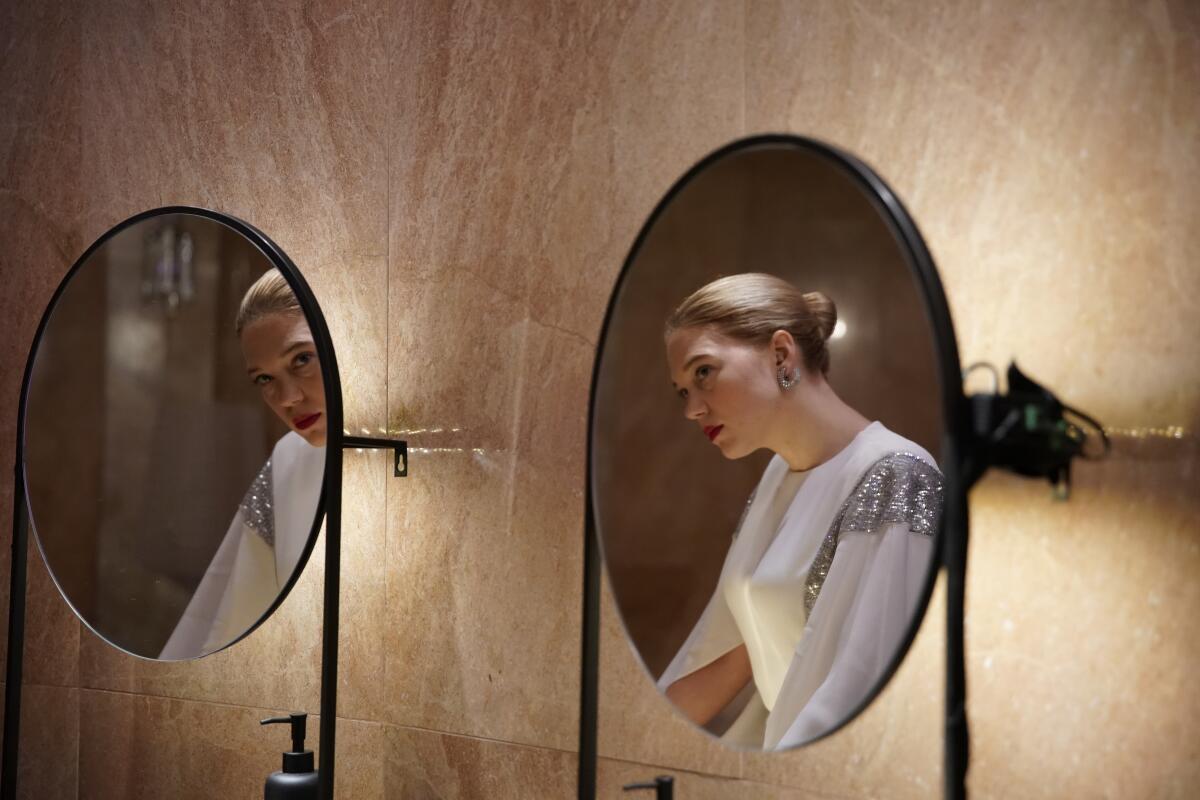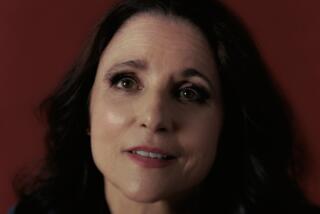Review: ‘France’ showcases Léa Seydoux as a guilt-ridden TV journalist

- Share via
The movie “France” has a main character named France de Meurs and is not exactly subtle for the ways in which the character and the film are meant to be a metaphor for the modern state of their namesake nation. Written and directed by Bruno Dumont, the movie captures a sense of a country more interested in image than reality and awkwardly grappling with a fast-changing culture with which traditional power structures can’t keep up. (Sound familiar?)
Played by Léa Seydoux, France de Meurs is a superstar television journalist, host of panel shows and her own reports. She is in a functional but unhappy marriage, lives in a palatial apartment that looks more like a museum and tries to dote on her unreceptive son.
One day she accidentally hits a delivery driver on a motor scooter with her car, injuring the young immigrant who supports his family. This sends France into a spiral of guilt and self-reflection, as she first tries to win over the family with charm and then ply them with money. This causes her to question her fame and ask herself for the first time if she is genuinely helping or hurting those she covers as a journalist as well as the people in her life.
Seydoux has been seen this year in the James Bond film “No Time to Die” and Wes Anderson’s “The French Dispatch.” When “France” premiered earlier this year at the Cannes Film Festival, Seydoux had three other films playing there and was unable to attend the festivities because she had been diagnosed with COVID while shooting anther project. “France” perfectly exhibits why she‘s in such high demand, as she easily blends the magnetic presence of a genuine star and the deeply felt interiority of a true actor.
“France” may be her richest performance yet, capturing the tension between the character’s roiling inner turmoil and her professionally placid exterior. Seydoux is such a striking screen presence that she nearly makes the lacquered hair and garish makeup of a flashy TV host seem chic. Everywhere she goes, someone asks for her picture; after her accident becomes tabloid fodder, paparazzi follow her about. Her fame, for which she worked so hard, becomes increasingly hollow and useless.
Throughout the film, we see the end of France’s broadcasts, as she wraps up argumentative, cross-talking guests. What is being said or who is saying it is beside the point. All that matters to her is the fireworks of the show, not the meaning of the content. Eventually, in a bathroom at a gala event, a woman asks France if she considers herself right-wing or left-wing politically and Seydoux plays the moment with a wonderful blankness, as if she had never even considered such a thing. She coolly delivers a non-response, asking “What difference would it make?”
The film is at its most biting when it satirizes a certain self-involved obliviousness. There is grim humor to scenes of France in the field, stage-directing refugees or Middle Eastern fighters on where to look and how to act for b-roll footage to fit what she needs, without much concern for what they are actually doing.

Blanche Gardin, a popular French comedian, plays France’s producer with a cynical bluntness that eventually catches up to both of them, with disastrous results. The film spins out toward the end, especially when it heaps additional tragedies on France. Yet it also leaves viewers often simply contemplating Seydoux’s face, at once open and inscrutable.
As if to make a film called “France” about a character named France even just a little more French, the film also features a score by Christophe, a musician revered in his native country but largely unknown in the United States. (His signature song, “Aline,” as performed by Jarvis Cocker, was featured in “The French Dispatch.”) Christophe died in 2020, shortly after completing his work on Dumont’s film.
Dumont has had an unusual career, moving from the austerity of his early films such as “The Life of Jesus” and “Humanity” to the more freewheeling and absurdist “L’il Quinquin” and “Slack Bay.” The new film combines those poles to an extent, with an intensity in the way it remains focused on the main character but able to use Seydoux’s star power to make something more accessible and appealing.
The film captures behind-the-scenes media drama in a much better fashion than the American streaming series “The Morning Show.” Seydoux brings a vulnerability to the role even when the character is at her most monstrous. In part because of the depth of Seydoux’s performance, the film becomes less an allegory of a nation and more a gripping character study, a portrait of a mask of personal and professional regard slowly slipping away.
‘France’
Not rated
Running time: 2 hours and 13 minutes
Playing: Starts Dec. 10 at Landmark’s Nuart Theatre, West Los Angeles
More to Read
Only good movies
Get the Indie Focus newsletter, Mark Olsen's weekly guide to the world of cinema.
You may occasionally receive promotional content from the Los Angeles Times.











